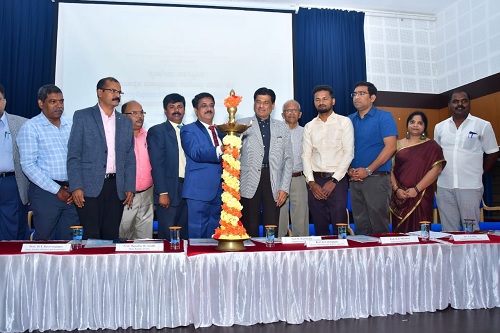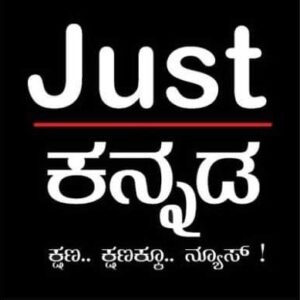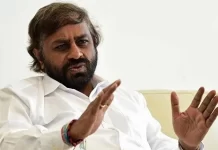ಮೈಸೂರು, ಡಿಸೆಂಬರ್,7, 2022 (www.justkannada.in): ಮೈಸೂರು ವಿಶ್ವವಿದ್ಯಾನಿಲಯದ ಸಿಎಸ್ಐಆರ್-ಯುಜಿಸಿ ನೆಟ್ ತರಬೇತಿ ಕೇಂದ್ರ (CSIR-UGC NET Training Centre), ಆಂತರಿಕ ಗುಣಮಟ್ಟ ಆಶ್ವಾಸನಾ ಕೋಶ (Internal Quality Assurance Cell), ಸಂಶೋಧನಾ ವಿದ್ವಾಂಸರ ಸಂಘವು (Research Scholars Association) ‘ಪರಿಣಾಮಕಾರಿ ಪರಿಶೋಧನಾ ಲೇಖನ ರಚನೆ: ನೆನಪಿನಲ್ಲಿರಬೇಕಾದಂತಹ ಅಂಶಗಳು’ ಎಂಬ ವಿಷಯದ ಕುರಿತು ಕಾರ್ಯಾಗಾರ ಆಯೋಜಿಸಿತ್ತು.
ಕಾರ್ಯಾಗಾರವನ್ನು ಉದ್ಘಾಟಿಸಿ ಮಾತನಾಡಿದ ಮೈಸೂರು ವಿಶ್ವವಿದ್ಯಾನಿಲಯದ ಕುಲಪತಿ ಪ್ರೊ. ಹೆಚ್. ರಾಜಶೇಖರ್ ಅವರು, ಕಾರ್ಯಾಗಾರದಲ್ಲಿ ಕೃತಿಚೌರ್ಯವನ್ನು ತಡೆಗಟ್ಟುವ ಕುರಿತು ವಿಚಾರಗೋಷ್ಠಿಗಳು ನಡೆಯುತ್ತಿದ್ದು, ಇದು ಅತ್ಯಂತ ಅರ್ಥಪೂರ್ಣ ಹಾಗೂ ಅಗತ್ಯವಾಗಿರುವ ವಿಚಾರವಾಗಿದೆ ಎಂದು ತಿಳಿಸಿದರು. “ಭಾರತದಲ್ಲಿ ಉನ್ನತ ಶಿಕ್ಷಣ ಸಂಸ್ಥೆಗಳ ಸಂಖ್ಯೆ ಕ್ಷಿಪ್ರ ಗತಿಯಲ್ಲಿ ಹೆಚ್ಚಾಗುತ್ತಿದ್ದು, ೫೨,೦೦೦ಕ್ಕೂ ಹೆಚ್ಚಿನ ಉನ್ನತ ಶಿಕ್ಷಣ ಸಂಸ್ಥೆಗಳನ್ನು ಹೊಂದಿದ್ದು ಈ ಮೂಲಕ ವಿಶ್ವದ ಉನ್ನತ ಶಿಕ್ಷಣ ವ್ಯವಸ್ಥೆಯನ್ನು ಹೊಂದಿದೆ. ಆದರೂ ಸಹ ಅನೇಕ ಶಿಕ್ಷಣ ಮಹತ್ವಾಕಾಂಕ್ಷಿಗಳಿಗೆ ಉನ್ನತ ಶಿಕ್ಷಣ ಲಭ್ಯವಾಗುತ್ತಿಲ್ಲ. ಪ್ರಸ್ತುತ ಭಾರತದಲ್ಲಿ ಉನ್ನತ ಶಿಕ್ಷಣದ ಪ್ರಮಾಣ ಶೇ.೨೭.೧ ರಷ್ಟಿದ್ದು, ೨೦೨೨ರ ವೇಳೆಗೆ ಶೇ.೩೨ ಪ್ರಮಾಣವನ್ನು ಸಾಧಿಸುವ ಗುರಿಯಿಂದ ಹಿಂದೆ ಉಳಿದಿದೆ,” ಎಂದು ತಿಳಿಸಿದರು.
“ಭಾರತ ಶಿಕ್ಷಣದ ಗುಣಮಟ್ಟವನ್ನು ಹೆಚ್ಚಿಸಲು ನಿರಂತರವಾಗಿ ಶ್ರಮಿಸುತ್ತಿದ್ದು ಎನ್ ಐಆರ್ ಎಫ್, ಎನ್ಎಎಸಿ ಹಾಗೂ ಇತರೆ ರ್ಯಾಂಕಿಂಗ್ ಏಜೆನ್ಸಿಗಳು ಉನ್ನತ ಶಿಕ್ಷಣ ಸಂಸ್ಥೆಗಳು ಒದಗಿಸುತ್ತಿರುವ ಶಿಕ್ಷಣದ ಗುಣಮಟ್ಟದ ಮೇಲೆ ಪ್ರಭಾವ ಬೀರಿದೆ. ಪ್ರಕಟಣೆಗಳಲ್ಲಿ ಭಾರತ ವಿಶ್ವದಲ್ಲಿ ಮೂರನೇ ಸ್ಥಾನದಲ್ಲಿದೆ. ಮೈಸೂರು ವಿಶ್ವವಿದ್ಯಾನಿಲಯದ ಸಾಧನೆ ಅತ್ಯುತ್ತಮವಾಗಿರದಿದ್ದರೂ ಸಹ ಈ ಸವಾಲಿನ ಸನ್ನಿವೇಶದಲ್ಲಿ ಗಮನಾರ್ಹವಾಗಿದೆ ಎಂದು ಅಭಿಪ್ರಾಯಪಟ್ಟರು.
ಕಳೆದ ವರ್ಷ ಮೈಸೂರು ವಿಶ್ವವಿದ್ಯಾನಿಲಯಕ್ಕೆ ನ್ಯಾಕ್ ವತಿಯಿಂದ ‘ಎ’ ಶ್ರೇಣಿ ಲಭಿಸಿದ್ದು, ವಿಶ್ವವಿದ್ಯಾನಿಲಯಗಳ ಪೈಕಿ ೩೩ನೇ ಶ್ರೇಯಾಂಕವನ್ನು ಪಡೆದುಕೊಂಡಿದೆ. ಈ ಮೂಲಕ ನಮ್ಮ ವಿಶ್ವವಿದ್ಯಾನಿಲಯವು ಕರ್ನಾಟಕದಲ್ಲಿ ಮೊದಲನೇ ಸ್ಥಾನದಲ್ಲಿ ನಿಲ್ಲಿಸಿದೆ. ನಮ್ಮ ವಿಶ್ವವಿದ್ಯಾನಿಲಯ ಇನ್ನೂ ಉತ್ತಮ ಸಾಧನೆ ಮಾಡಬಹುದಾಗಿತ್ತು. ಆದರೆ ಬೋಧಕರ ಕೊರತೆ ಹಾಗೂ ಸಂಶೋಧನಾ ಪರಿಣಾಮದ ಕೊರತೆಯಿಂದಾಗಿ ಸಾಧ್ಯವಾಗಿಲ್ಲ, ಎಂದು ವಿವರಿಸಿದರು.
“ಕೃತಿಚೌರ್ಯ ಎಂದರೆ ತಿದ್ದಲಾಗದ ಸಮಸ್ಯೆ, ಅದರಲ್ಲಿಯೂ ವಿಶೇಷವಾಗಿ ಉನ್ನತ ಶಿಕ್ಷಣ ಕ್ಷೇತ್ರದಲ್ಲಿ ಈ ಸಮಸ್ಯೆ ಹೆಚ್ಚಾಗಿದೆ. ಕೃತಿಚೌರ್ಯದ ಪರಿಣಾಮಗಳು ವ್ಯಕ್ತಿಗತ, ವೃತ್ತಿಪರ, ತಾತ್ವಿಕ ಹಾಗೂ ಕಾನೂನು ಈ ಪೈಕಿ ಯಾವುದಾದರೂ ಅಂಶಗಳ ಮೇಲೆ ಉಂಟಾಗಬಹುದು. ಕೃತಿಚೌರ್ಯ ಎಂದರೆ ಮತ್ಯಾರದ್ದೋ ಕೆಲಸವನ್ನು ಅವರಿಗೆ ಮಾನ್ಯತೆ ನೀಡದೆ ಅದನ್ನು ಬಳಸಿಕೊಳ್ಳುವುದು ಎನ್ನಬಹುದು. ಶೈಕ್ಷಣಿಕ ಬರವಣಿಗೆ ಕ್ಷೇತ್ರದಲ್ಲಿ ಕೃತಿಚೌರ್ಯದಲ್ಲಿ, ಯಾವುದಾದರೂ ಒಂದು ಮೂಲದಿಂದ ಪದಗಳು, ಕಲ್ಪನೆಗಳು ಹಾಗೂ ಮಾಹಿತಿಯನ್ನು ತೆಗೆದುಕೊಂಡು ಅದನ್ನು ಸರಿಯಾದ ಅರ್ಥ ಬಾರದಿರುವಂತೆ ಬಳಸಿಕೊಳ್ಳುವುದು,” ಎಂದು ವಿವರಿಸಿದರು.
“ಕೃತಿಚೌರ್ಯವು ವಿದ್ಯಾರ್ಥಿಯ ಪ್ರತಿಷ್ಠೆ, ವೃತ್ತಿಪರ ಪ್ರತಿಷ್ಠೆ, ಶಿಕ್ಷಣದ ಪ್ರತಿಷ್ಠೆಗಳು ನಾಶಗೊಳ್ಳುವುದಷ್ಟೇ ಅಲ್ಲದೆ, ಕಾನೂನು ಪರಿಣಾಮ, ಹಾಗೂ ಹಣಕಾಸಿನ ಪರಿಣಾಮಗಳೂ ಉಂಟಾಗುತ್ತವೆ. ಪ್ರಬಂಧಗಳನ್ನು ಬರೆಯುವುದಕ್ಕೆ ಮುಂಚೆ ಕೃತಿಚೌರ್ಯದ ಬಗ್ಗೆ ತಿಳಿದುಕೊಳ್ಳುವುದು ಹಾಗೂ ಅದನ್ನು ತಪ್ಪಿಸುವುದರ ಕುರಿತು ತಿಳಿದುಕೊಳ್ಳುವುದು ಅಗತ್ಯ,” ಎಂದು ಅಭಿಪ್ರಾಯಿಸಿದರು.
ಕಾರ್ಯಕ್ರಮದಲ್ಲಿ ಮೈಸೂರು ವಿವಿ ವಿಶ್ರಾಂತ ಕುಲಪತಿ ಪ್ರೊ.ಕೆ.ಎಸ್ ರಂಗಪ್ಪ, ಐ.ಎನ್ ಎಸ್ ಎ ಹಿರಿಯ ವಿಜ್ಞಾನಿ ಹಾಗೂ ದೆಹಲಿ ವಿವಿ ಸಸ್ಯಶಾಸ್ತ್ರ ವಿಭಾಗದ ಮಾಜಿ ಅಧ್ಯಕ್ಷ ಪ್ರೊ.ಕೆ.ಆರ್ ಶಿವಣ್ಣ, ಕಲಾ ನಿಕಾಯ ಡೀನರಾದ ಪ್ರೊ. ಮುಜಾಫರ್ ಹೆಚ್ ಅಸಾದಿ, ವಿಜ್ಞಾನ ಮತ್ತು ತಂತ್ರಜ್ಞಾನ ನಿಕಾಯ ಡೀನರಾದ ಪ್ರೊ ಹೆಚ್.ಟಿ ಬಸವರಾಜಪ್ಪ, ಕಾನೂನು ನಿಕಾಯ ಡೀನರಾದ .ಟಿ.ಆರ್ ಮಾರುತಿ, ಶಿಕ್ಷಣ ನಿಕಾಯ ಡೀನ್ ಪ್ರೊ. ಎಸ್ ಮದಿಅಳಗನ್, ಎಂಜಿನಿಯರಿಂಗ್ ನಿಕಾಯ ಡೀನ್ ಪ್ರೊ. ಬಿ. ಶಂಕರ್, ಮೈಸೂರು ವಿವಿ ಐ.ಕ್ಯೂ.ಎ.ಸಿ ನಿರ್ದೇಶಕ ಪ್ರೊ. ಕೆ.ಎನ್ ಅಮೃತೇಶ್ ಉಪಸ್ಥಿತರಿದ್ದರು.
Key words: Mysore university- VC-Prof. H. Rajashekhar- plagiarism
ENGLISH SUMMARY…
Impacts of plagiarism are serious: UoM VC Prof. H. Rajashekar
Mysuru, December 7, 2022 (www.justkannada.in): The CSIR-UGC NET Training Centre, Internal Quality Assurance Cell and Research Scholars’ Association of the University of Mysore had jointly organized a workshop on the topic, “Writing an Effective Research Paper: Points to be borne in Mind.’
Prof. H. Rajashekar, Vice-Chancellor, University of Mysore inaugurated the workshop. IN his address he said that he is pleased to understand that the workshop deliberates on ‘prevention of plagiarism.’ Higher education institutions in India are growing in numbers rapidly. India has the world’s most extensive higher education system, with more than 52,000 institutions. But still access to higher education remains a distant goal for many aspirants. Presently, the figures stand at 27.1 per cent far from the targe of achieving 32 per cent by 2022, he said.
“India is continuously striving to improve the quality of education. The National Institutional Ranking Framework (NIRF), NAAC and other ranking agencies have impacted the quality of education offered by the higher education institutions in India. India is the third country in the world for publications,” he said.
“The performance of the University of Mysore is quite admirable under the challenging situation, although not exemplary. Last year the University of Mysore was accredited with ‘A’ grade by NAAC, and recently ranked 33rd in the University category. These gradings have placed our University in the top position among the State University in Karnataka. Our rankings would have been better with faculty strength and research output,’ he added.
“Plagiarism is an intractable problem and is especially prominent in higher education. The consequences of plagiarism can be personal, professional, ethical and legal. Plagiarism means using someone else’s work without giving them proper credit. In academic writing plagiarizing involves using words, ideas and information from a source without citing it correctly,” he explained.
“The consequences of plagiarism are far-reaching and no one is immune. Neither ignorance nor stature excuses a person from the ethical and legal ramifications of committing plagiarism.”
University of Mysore former Vice-Chancellor Prof. K.S. Rangappa, INSA Senior Scientist and Delhi University Botany Department former Chairman Prof. K.R. Shivanna, Dean Faculty of Arts, Prof. Muzaffar H. Asadi. Dean Faculty of Science and Technology Prof. H.T. Basavarajappa, Dean Faculty of Law T.R. Maruti, Dean Faculty of Education Prof. S. Madi Azaghan, Dean Faculty of Engineering Prof. B. Shankar, UoM IQAC Director Prof. K.N. Amrutesh and others were present.
Keywords: Workshop/ Plagiarism/ impacts/ serious








